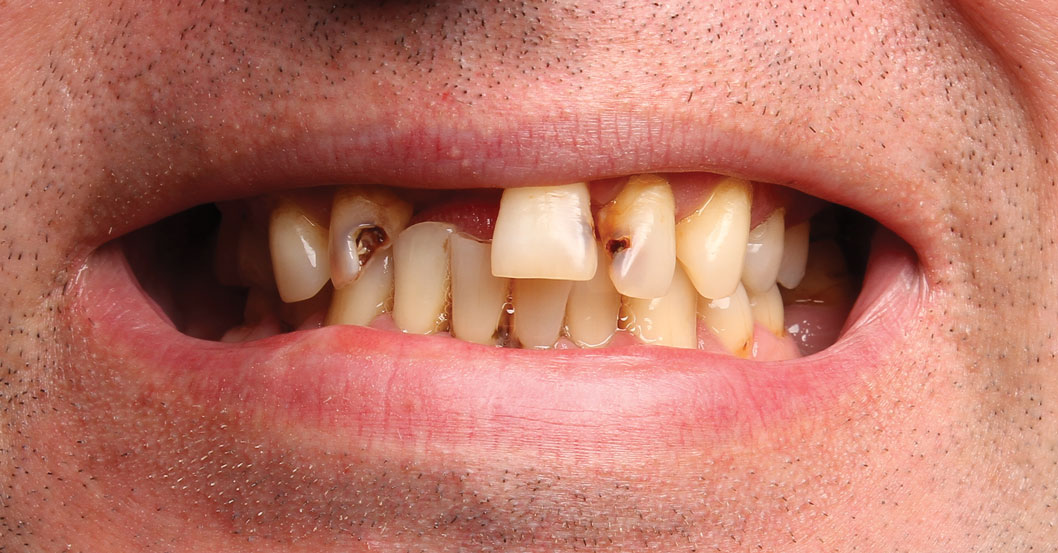Everyone knows that you are meant to go and see the dentist every six months, but why? What’s the point? Is it just so that dentists can live a lavish lifestyle, drive fast cars and take nice holidays?
I know I’m going to say something very controversial here: dental treatment is not very good.
What, a dentist saying that his product is not good? What is the meaning of this?
Fillings, crowns, dentures, implants… none of these are anywhere near as good as the teeth that you were born with.
I often say (now) to patients that I’m nowhere near as good as the big dentist in the sky. (I used to say that I’m not as good as ‘the big dentist upstairs’ but all my patients went to reception and requested they see the guy on the first floor the next time they came in!!!!)
The problems with dental treatment
Teeth are made out of enamel and dentine, and unfortunately nothing that is man-made as a dental restorative material, is as good and long-lasting as a natural tooth. As long as that natural tooth is cared for properly.
That is why our goal, as dentists, is to help you to keep your teeth for life.
What are teeth for?
So, I guess it’s pretty universally accepted that teeth are important. But what do we really need them for?
Some of the reasons are obvious and some perhaps we take for granted a little bit. We need teeth to enable us to chew our food properly so that we can get adequate nutrition.
We know that most of the nutrients that we need are found in raw foods and foods that take some breaking down before they are digestible for us. So without teeth, we are often left with quite a restricted diet and frequently, it’s a diet that isn’t as healthy as it should be.
So having a healthy set of teeth is like having a really good set of tools and is really important for overall health and well being.
What’s in a smile?
Teeth are also really important because smiling is really important. A smile is an instant way to connect with somebody else and when you see somebody smiling at you it’s difficult not to smile back at them. That’s why having a nice smile, or at least having teeth that one is not self-conscious about showing, is so important from a social standpoint. Smiling, laughing and generally connecting with others in this way is also really important from a mental health point of view. Having a nice set of ‘pearly whites’ is like having a lovely set of jewellery that we wear in our mouths.
It’s obvious that teeth are important to us from both a physical and mental health aspect and are key to complete wellness.
What are the threats?
There are three main threats to keeping our teeth for life:
- Dental decay that is caused by sugar and poor diet
- Gum disease that is caused by inadequately removing plaque from around teeth
- Tooth wear that can be caused by a few different things.
Dental decay
Teeth are hard and strong. This is because they are made up of densely packed minerals. When we have sugar our mouth becomes acidic, however, our mouth is able to neutralise this acid.
If we have more and more sugar (especially between meals) then our defences become overwhelmed and the mouth stays acidic. When this happens, the mineral within the tooth starts to dissolve. When the mineral dissolves it comes out of the tooth making the tooth much weaker and allows holes to form as the tooth starts to rot. This is the process of dental decay. It is fundamentally important that your dentist checks for and advises you on how to reduce it, and obviously how to restore any destruction caused by dental decay, by placing restorations on your teeth such as fillings and crowns.
Gum disease
Everybody has bacteria in their mouth. It aggregates together to form plaque. This is that white sticky stuff that you can scrape away from your teeth before you brush them. If this plaque is allowed to stay close to your teeth and gums then it causes irritation that we call inflammation.
This inflammation can affect the gums and make them bleed but it can also affect the bone that your teeth are held firmly within. It can make the bone recede and shrink away reducing the amount of support that your tooth has, and can ultimately lead to your teeth wobbling and eventually being lost.
When you see your dentist, hygienist or therapist, they are able to clean your teeth professionally and remove plaque from the hard-to-reach areas. They can also coach you on how best to remove the plaque from these areas when you are at home.
They can then monitor you to see if you have lost any bone and try and treat areas where this has happened before the teeth become wobbly, and certainly before they are lost.
Tooth wear
Teeth wear down. It is a fact of life as we all get older that there is always some wear and tear on our body parts. What dentists look for is what we call age inappropriate wear: when the teeth appear to be wearing down much faster than they should. Obviously if your teeth are wearing down too quickly then as you get older you will be left with very small and flat teeth which do not look very nice and also won’t be able to do their job of chewing properly.
Erosion – chemical wear
Teeth can wear down because of erosion which is caused by acids in the diet (this is different to dental decay because this is not sugar that’s converted into acid. This is caused by acid that’s present in acidic foods and drink, including fizzy drinks, fruit juices and even some fruit teas).
If your dentist spots that your teeth are being eroded, they can coach you as to what foods are good and bad for you, how and when to consume them in a responsible way and also methods for helping to neutralise the acid in the mouth, such as using special toothpastes.
Attrition – mechanical wear
Teeth can also be worn down by a mechanism called attrition, which is where teeth grind against each other inappropriately. This is often something that happens at night-time and is commonly linked with stress or a poor bite. This can happen if we clench or grind our teeth and can put immense stress on the teeth, causing either tooth wear or even for our teeth to break and chip.
If your dentist suspects that this is happening then they may recommend a mouthguard for you to wear to protect your teeth from further wear.
Make an appointment
Hopefully you can see that by visiting the dentist regularly the focus of what we do is to prevent diseases before they start, by coaching you, motivating you and providing you with the knowledge and strategies to help look after your teeth before problems start. We can also recommend the right tools to help you look after yourself at home optimally.
We want to help you to keep your teeth for life so please do make sure you go and see your dentist regularly.
 Dr Alif Moosajee is the Principal Dentist at Oakdale Dental, a specialist dental practice in Leicester, and is also the author of the book ‘The Smiling Dentist’ a jargon-free book for patients about clinical dentistry.
Dr Alif Moosajee is the Principal Dentist at Oakdale Dental, a specialist dental practice in Leicester, and is also the author of the book ‘The Smiling Dentist’ a jargon-free book for patients about clinical dentistry.
He has a particular interest in dental implants and digital dentistry and a keen interest in education, lecturing on a wide array of topics.
Alif regularly makes appearances on BBC TV and radio and on Channel 5 commenting on topical dental issues. After writing his book, he continues to put pen to paper writing regularly for dental and non-dental magazines.
He won the Best Young Dentist UK award and the Fast Track 4 award in 2016 and has also received awards for his writing.
Away from dentistry he is a devoted father and husband and adores spending time with his wife and daughter.
